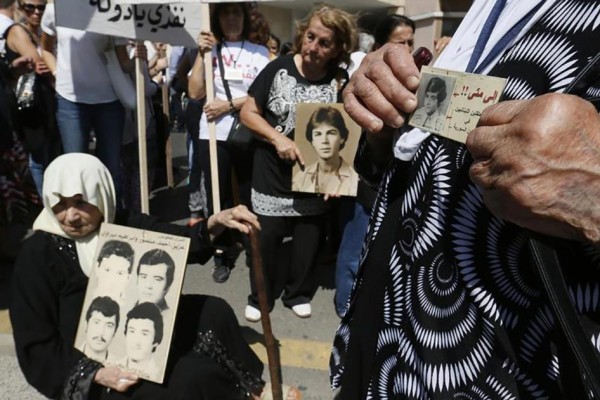
“Lebanese authorities should move forward on proposals to set-up an independent national commission to investigate the fate of people forcibly disappeared during the country’s 1975-1990 civil war and aftermath, Human Rights Watch said today on the eve of the International Day of the Victims of Enforced Disappearances. The United Nations designated August 30 as the International Day of the Disappeared to raise awareness about enforced disappearances around the world.
Lebanese authorities have failed to address the issue adequately, Human Rights Watch said. While Lebanon has not witnessed large numbers of enforced disappearances since the 1990s, Human Rights Watch has documented a handful of cases of Syrians who apparently were forcibly disappeared in Lebanon since the outbreak of the conflict in Syria. Lebanese authorities should investigate and prosecute those recent cases.
“Despite repeated promises, Lebanese authorities have yet to provide the families of the disappeared with any answers about the fate of their loved ones,” said Nadim Houry, deputy Middle East director. “Lebanon cannot move forward without adequately dealing with its past.”
Enforced disappearances are among the gravest crimes in international law and may constitute a crime against humanity, if part of a bigger attack against the civilian population.
An estimated 17,000 Lebanese were kidnapped or “disappeared” during the civil war of 1975-90. In addition, scores of citizens and Palestinians “disappeared” in Lebanon after 1990 during Syria’s military presence in the country and are known or believed to have been transferred to detention in Syria.
In a victory for the families of the disappeared, Lebanon’s State Council, the judicial institution overseeing the legality of administrative work by public authorities, ruled on March 4, 2014 that relatives of people who have disappeared in Lebanon have the right to know what happened to their missing family members and ordered the government to hand over to the families the full investigation dossiers of the Official Commission of Inquiry that had been appointed in 2000 to investigate the fate of the kidnapped.
The 2000 commission, consisting of five military and intelligence officers, operated for only a few months and then issued a “summary report” concluding that all those missing for more than four years should be considered dead. The commission did not provide any information on any specific cases.
On September 20, 2014, the families of the disappeared were finally provided with a copy of the commission’s investigative files and found that the commission had not conducted any serious investigation or interviewed any officials. Wadad Halwani, head of the Committee of the Families of the Kidnapped and Disappeared in Lebanon, said that the investigation files showed that the government had not conducted any serious investigation but welcomed the judicial decision affirming the right of families to know the fate of their loved ones.
A joint Syrian-Lebanese committee, established in May 2005 to investigate cases of enforced disappearances involving Syrian security forces, never produced any concrete result or published any of its findings. The committee has stopped meeting.
To move forward, the Committee of the Families of the Kidnapped and Disappeared in Lebanon as well as other nongovernmental groups have proposed a draft law to create an independent national commission to investigate the fate of the disappeared. The commission would include representatives of victims’ families as well as nongovernmental groups and have a broad mandate to investigate and question former officials.
The Committee of the Families has also pressed for the creation of a DNA database for the relatives of the disappeared to help in any future identification. Former Justice Minister Shakib Qortbawi put forward a draft decree to the cabinet in October 2012 to establish a national commission to investigate the fate of Lebanese and other nationals who disappeared during and after the Lebanese civil war. The cabinet formed a ministerial committee to examine the draft, but no further action was taken.
In addition to setting up a national commission, Human Rights Watch urged the authorities to ratify the United Nations Convention for the Protection of All Persons from Enforced Disappearances and to prosecute recent cases of enforced disappearances on its territory.
In the fall of 2014, two Syrian men disappeared following the conclusion of their prison sentences in Roumieh prison and their subsequent transfer into the custody of General Security, the country’s security agency, which regulates the entry and exit of foreigners into Lebanon. General Security refused to disclose their whereabouts to their family members and also refused to respond to written request from Human Rights Watch. Both men’s whereabouts remain unknown.
“The only way to prevent future disappearances is to ensure accountability for past ones,” Houry said.
HRW

Leave a Reply
You must be logged in to post a comment.